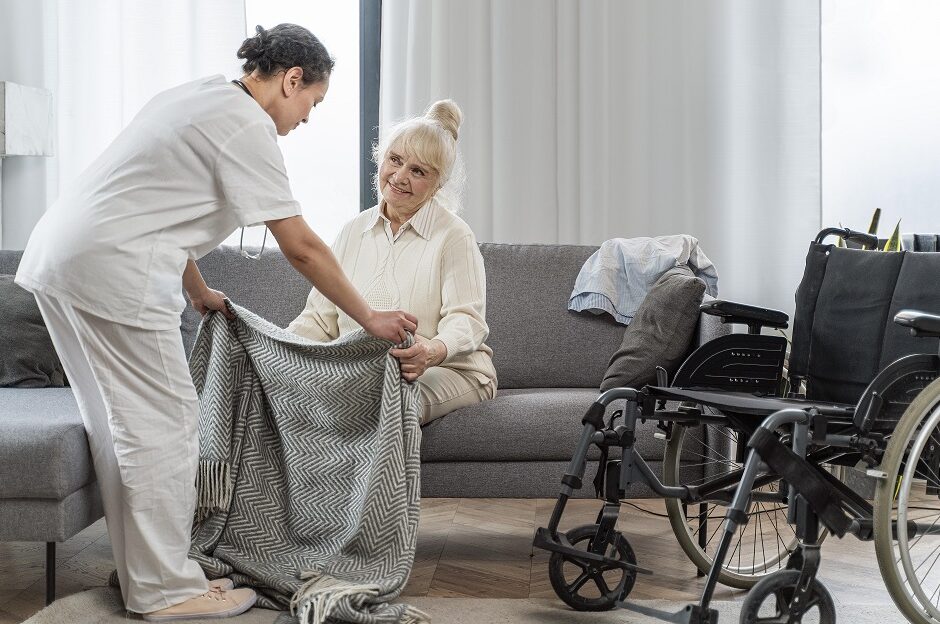Deborah Sturdy: Anyone who knows me well will be aware of my mission to expand the already impressive skills sets of social care nurses. The further embedding of delegated healthcare interventions in the care workforce in England represents our ongoing initiative to marry social care experience with clinical excellence to deliver enhanced, high quality and consistent care.
To achieve this, Skills for Care and the Department of Health and Social Care (DHSC) have been working in collaboration with partners to develop guiding principles with person-centred decision making at their heart. I’m therefore delighted to post this joint blog with Skills for Care’s CEO, Oonagh Smyth, setting out our current thinking and the work to date.

Building on current practice
These voluntary principles will complement rather than replace existing person-centred practice to support safe and effective delegated healthcare activity to social care workers by regulated healthcare professionals in a range of social care settings.
We know delegation to social care isn’t new and where it works well with the right governance, protocols, education, training and support, it can bring wider benefits to people drawing on care and support.
These guiding principles can demonstrate where appropriate delegation can enable people drawing on care and support to have greater choice and control. Person-centred decision making allows people more flexibility to suit their needs and lifestyle, giving a better experience of care and a positive impact on their health and wellbeing.

Our progress
In developing the principles, we have engaged with health and social care professionals, people with lived experience, regulators and our colleagues in Wales, Scotland and Northern Ireland, as well as establishing an expert reference group. We’ve gathered a wealth of information that will shape the principles with publication planned for late spring 2023.
Feedback from our engagement has been positive, recognising the value of delegation for all involved. Key themes include the focus on a person-centred approach to delegation with consent, choice and control at the heart of decision-making. Other themes include resourcing and commissioning practices, the importance of clear and defined roles and responsibilities and how to create the right conditions for collaborative working.
Our partnership work with the National Care Forum, Association of Directors of Adult Social Services (ADASS), St Martins Care, Lincolnshire Care Association (LINCA) and the Foundation of Nursing Studies (FoNS) has been invaluable. We have gathered insight and learning from their networks and individual projects, resulting in tools and resources to support implementation of the guiding principles.
The work continues
We continue to meet with as a quarterly steering group and held the second meeting of the Expert Reference Group this month, bringing together key sector stakeholders to shape the principles and share ideas. Our engagement will continue as the guiding principles work on delegation evolves.
The guiding principles will provide a solid foundation for safe and effective delegation and our next steps will be to support implementation across a number of areas, using the learning to make continuous improvements with sector led accountability and ownership.
Find out more at Skills for Care
3 comments
Comment by Debbie Saunders posted on
This is such great progress and I am so excited to see this become a reality. The cost saving this will incur by using the skills of those supporting the vulnerable people (once trained and upskilled) must surely allow for the carer to be remunerated financially (on the saving from services) to want the carers to remain in the adult social care workforce. It encourages career development and workforce retention, which can only be a good thing right now. What is also allows is true person centred care, as the care can be provided in the correct environment at the correct time when the person needs it, no more waiting for services to arrive..
Comment by Stella Crew posted on
Can it also be noted that social care workers are doing (with training but with still low pay and value) aspects of care that were previously done by nurses- peg feeding & medazolam treatment where needed for clients undergoing epilepsy. Thank you, Stella
Comment by Sonya Collins posted on
Surely the use of Personal Health Budgets are the useful way to utilise person centered decision making? They include flexibility once they have been given that is. Plus they enable people to choose who they want to give them health care at home. There is a system already set up to do this but sadly it never materialises. I note that you have included people with Lived Experience does this include all types of impairments or is it people who are involved already? I support and advocate for children and adults with social care as well as Health care. If only we could get people with long term illness the health care in their own homes not only would it save money but it would give the person the choice and control back. To be able to choose but to get the support from social care nurses would make such a difference lives. But as with everything this would mean a change to some local government/NHS Trust changes to Continuing health care.. I hope that progress is made swiftly and happily there are those out there like yourself who are striving for that..